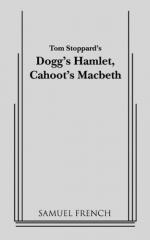|
This section contains 1,759 words (approx. 5 pages at 400 words per page) |

|
In the following essay excerpt, Sammells explores the "spontaneous" language of dissent utilized by Stoppard in Dogg's Hamlet, Cahoot's Macbeth.
In Dogg's Hamlet, Cahoot's Macbeth, however, Stoppard returns to the formal exuberance of the earlier stage plays. In the first half of the play, by staging a language-game from Wittgenstein's Philosophical Investigations, Stoppard attempts to teach a new language to the audience. This element of engagement is heightened in the second half when the bizarre proceedings (which have included crude slapstick and the staging of a ravaged Shakespearean text) are suddenly transposed into a new and menacing context. Philosophical parlour-game and mildly diverting stage-business are given a critically new aspect. Dogg's Hamlet, Cahoot's Macbeth evinces, in this sense, the same intention as Travesties; both show Stoppard's desire to ambush his audience's assumptions about the kind of play they are watching.
The opening section (a conflation of two...
|
This section contains 1,759 words (approx. 5 pages at 400 words per page) |

|




